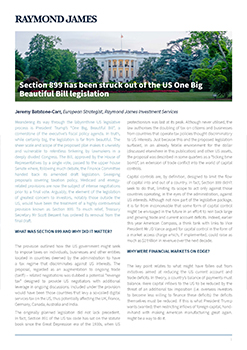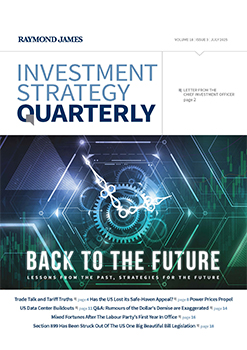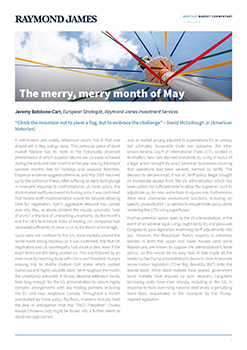History was made once again on Thursday, as AI posterchild Nvidia closed the trading day up 0.75% at $164.10 per share—becoming the first company in history to surpass a $4 trillion market capitalisation. Nvidia has been at the forefront of the AI revolution, powering the ambitions of tech giants like Microsoft, Meta, and Alphabet with their processing units. These chips are central to the massive investments these companies are making in artificial intelligence. Remarkably, Nvidia’s market cap now exceeds the combined value of the entire UK stock market.
Last week, markets were focused on the looming July 9th deadline, when President Trump was expected to reimpose his “Liberation Day” tariffs on countries that had not secured a trade deal with the United States. Despite insisting he would not delay the deadline, Trump ultimately postponed it again, this time to August 1st granting countries a three-week reprieve. However, formal warning letters have already been sent out. Many nations have expressed their intent to finalise agreements, but reaching mutually beneficial terms has proven challenging. The most optimistic takeaway for many countries so far is that “progress” is being made.
Keeping up with the latest tariff announcements has become increasingly difficult, and a sense of malaise has settled over the markets, especially after copper became Trump’s next target. Copper prices in the U.S. surged to an all-time high of $5.84 per lb after Trump calmly declared, “Today we’re doing copper,” followed by, “We’re going to make it 50%.” The U.S. imported 810,000 tons of copper in 2024, a critical material not only for manufacturing and construction but also for military equipment. Markets began to take the announcement seriously when U.S. Commerce Secretary Lutnick confirmed that the copper tariff is expected to be signed into effect at the beginning of next month.
Trump has also turned his attention to Brazil, announcing a sweeping 50% tariff on all Brazilian imports to the U.S. The sudden move followed legal action against Trump’s close ally, former Brazilian President Bolsonaro, who is facing a lawsuit over his alleged role in a plot to overturn the 2022 Brazilian election. Trump responded on his Truth Social platform, calling the case a “witch hunt” and demanding it “end immediately.” This development further strains the already tense relationship between Trump and current Brazilian President Lula.
In a surprising move this week, X CEO Linda Yaccarino announced her resignation via a tweet. Yaccarino, who joined the company in 2023, was brought on to help owner Elon Musk rebuild relationships with advertisers, many of whom had distanced themselves due to Musk’s controversial public statements. She was also tasked with transforming X into a multi-functional platform, incorporating payments, video, and AI integration. Her tenure can be seen as a partial success, though it was often overshadowed by Musk’s unpredictability, which at times undermined her efforts.
While the week has been dominated by U.S. developments, the UK also made headlines this morning with the release of disappointing GDP data. The UK economy contracted by -0.1% in May, marking the second consecutive month of decline. This came as a surprise to markets, which had forecast a modest 0.1% expansion. The continued downward trend in growth may influence the Bank of England’s upcoming decision on whether to cut interest rates. Meanwhile, pressure is mounting on Chancellor Rachel Reeves, especially following last week’s welfare reform U-turn. She reiterated her commitment to jumpstarting economic growth and delivering on her promises.
Despite the week’s unpredictability, equity markets have continued their upward momentum, with both the S&P 500 and Nasdaq reaching new all-time highs. The FTSE 100 also hit a record high, buoyed by strong performances in the mining and healthcare sectors.
Nathan Amaning, Investment Analyst
Risk warning: With investing, your capital is at risk. The value of investments and the income from them can go down as well as up and you may not recover the amount of your initial investment. Certain investments carry a higher degree of risk than others and are, therefore, unsuitable for some investors






